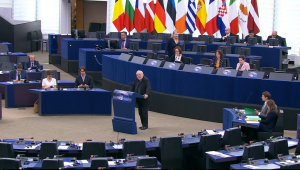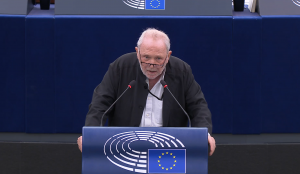We know what we wish for. We wish for accession and accession: accession to the EU and accession to NATO. Our wish is clear but, unfortunately, we won’t be alone to decide. The United States will … let’s say co-decide with us. And so, to assess the future relations of Ukraine with the EU and NATO, we need to know what will happen in three weeks.
In the first scenario, everything is tragically clear. If Donald Trump is elected, this man will not wait until he takes office to seal with Vladimir Putin a division of Ukraine based on the model of the two Germanies or the two Koreas.
De facto, the territories occupied by Russian troops would go to the Kremlin which, in exchange, would commit not to cross the demarcation line. This would be Ukraine’s defeat and Vladimir Putin’s victory but a debate would open up immediately, a debate both fundamental and furious.
Should Ukraine, amputated by a so-called “peace agreement”, join NATO or not?
Assuming that the agreement reached between the Russian President and his friend Donald did not bar it from membership, Ukraine would be more eager than ever to join. The Europeans, for their part, would have a vital interest that Ukraine become the thirty-third member of the Atlantic Alliance, because the Ukrainians would then benefit from a level of protection that we, Europeans, cannot grant them today. For both Ukraine and the European Union, this enlargement of NATO would be the only real way of preventing Vladimir Putin from trying to rebuild the Russian empire by soon marching again on Kiev. In short, Europeans should prepare to fight this battle without waiting for the 5th November results, but they should keep two things in mind.
One is that Donald Trump would not be easily persuaded to accept Ukraine’s accession to a NATO he no longer sees as necessary, to put it mildly or diplomatically. The other thing to keep in mind is that the Europeans will have to do more than to tighten the Western ranks under the American umbrella, because this is a new century, a new era. The United States is already focusing on the Chinese challenge. This president would certainly wish to hasten this process and might be tempted to altogether turn his back on the Atlantic Alliance.
Under a new Trump presidency, the Europeans would have to learn to exist on their own, to speed up, to really speed up the creation of their common defence and to define new modes and degrees of integration. They would have to reinvent the accession process in order to open their doors as quickly as possible to Ukraine and in order to be able, also, to immediately form a common front with our neighbour and friend.
To tell you the truth, the aim would be first to rely on the Ukrainian defence system to shorten the time necessary to build a European defence. And of course, the aim would be also to send a message to Russia that should it attack Ukraine again, it would be attacking the whole Union. In the Trump scenario, the objective of the Europeans should be, without delay, to integrate Ukraine into the European Union and, if possible, into the Atlantic Alliance.
But what if Harris wins?
In this second scenario, everything would be both more reassuring and more complicated.
There would be no need to fear that the American administration would come to an agreement with the Kremlin at the expense of Ukraine, that is at the expense of the entire Europe. Nor would it be conceivable that the United States would suddenly start to discredit the Atlantic Alliance or want to leave it overnight. With Kamala Harris, the European Union would not be faced with the impossible challenge of reinventing itself in just a few months. But… because there is a but : but, actually would the differences between president Harris and president Trump be so deep?
Unlike Trump, Harris has no admiration for Vladimir Putin, certainly not. Unlike him, she doesn’t see the European Union as a rival that America should undo, but she is Californian and was still rather young, very young when the Berlin Wall fell.
We know that they are different.
But for Harris, like for Trump, the United States must turn its eyes towards Asia not towards Europe. And there is more. Everything indicates that Harris would like to quickly bring the Ukrainians to a compromise with Russia that could be rather similar, and maybe even very similar to the one prepared by her Republican opponent.
So, let’s see the reality. If Harris acted decently and politely enough so that Europe doesn’t seem nor feel betrayed, several European capitals would approve this approach. And more than that: on the right, on the left and in the centre, a large part of the 27 member states’ citizens’ opinions would also applaud it. In the relief that this illusion of détente would bring, it would become difficult to plead for Ukraine’s entry into the Atlantic Alliance or into the European Union.
Just as the election of Trump could force the European Union to assume its political responsibilities, the election of Kamala Harris would deeper divide the 27 and lead them to a new and dangerous phase of procrastination.
So, again, let’s face the reality. As unpleasant, as sad as it would be, instead of a NATO membership, the Europeans might unfortunately have to – and I hate to say so – plead in Washington for Western security guarantees for Ukraine. This would be less difficult and, rather than trying to immediately open the doors of the European Union to our Ukrainian friends, we Europeans might have to increase dramatically the number of civil and military cooperation agreements with them in order to strengthen our border with Russia and use the tools of gradual integration to pave the way to accession.
Harris or Trump, the 5th of November will put us, Europeans, to the test.




